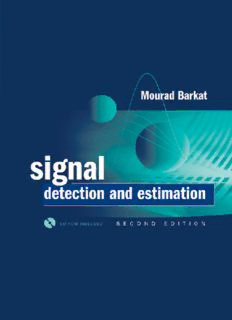Table Of ContentSignal Detection and Estimation
Second Edition
DISCLAIMEROFWARRANTY
The technical descriptions, procedures, and computer programs in this book
have been developed with the greatest of care and they have been useful to the
author in a broad range of applications; however, they are provided as is, with-
outwarrantyofanykind.ArtechHouse,Inc.,andtheauthorofthebooktitled
Signal Detection and Estimation, Second Edition, make no warranties, expressed
or implied, that the equations, programs, and procedures in this book or its
associated software are free of error, or are consistent with any particular stan-
dardofmerchantability,orwillmeetyourrequirementsforanyparticularappli-
cation. They should not be relied upon for solving a problem whose incorrect
solutioncouldresultininjurytoapersonorlossofproperty.Anyuseofthepro-
grams or procedures in such a manner is at the user’s own risk. The editors,
author, and publisher disclaim all liability for direct, incidental, or consequent
damages resulting from use of the programs or procedures in this book or the
associatedsoftware.
For a listing of recent titles in theArtech House Radar Library,
turn to the back of this book.
Signal Detection and Estimation
Second Edition
Mourad Barkat
artechhouse.com
Library of Congress Cataloging-in-Publication Data
Barkat, Mourad.
Signal detection and estimation/Mourad Barkat.—2nd ed.
p. cm.
Includes bibliographical references and index.
ISBN 1-58053-070-2
1. Signal detection. 2. Stochastic processes. 3. Estimation theory. 4. Radar. I. Title.
TK5102.5.B338 2005
621.382'2—dc22 2005048031
British Library Cataloguing in Publication Data
Barkat, Mourad
Signal detection and estimation.—2nd ed.—(Artech House radar library)
1. Signal detection 2. Stochastic processes 3. Estimation theory
I. Title
621.3'822
ISBN-10: 1-58053-070-2
Cover design by Igor Valdman
© 2005 ARTECH HOUSE, INC.
685 Canton Street
Norwood, MA 02062
All rights reserved. Printed and bound in the United States of America. No part of this book may
be reproduced or utilized in any form or by any means, electronic or mechanical, including pho-
tocopying, recording, or by any information storage and retrieval system, without permission in
writing from the publisher. All terms mentioned in this book that are known to be trademarks or
service marks have been appropriately capitalized. Artech House cannot attest to the accuracy of
this information. Use of a term in this book should not be regarded as affecting the validity of
any trademark or service mark.
International Standard Book Number: 1-58053-070-2
10 9 8 7 6 5 4 3 2 1
To my wife and my children
Contents
Preface xv
Acknowledgments xvii
Chapter 1 Probability Concepts 1
1.1 Introduction 1
1.2 Sets and Probability 1
1.2.1 Basic Definitions 1
1.2.2 Venn Diagrams and Some Laws 3
1.2.3 Basic Notions of Probability 6
1.2.4 Some Methods of Counting 8
1.2.5 Properties, Conditional Probability, and Bayes’ Rule 12
1.3 Random Variables 17
1.3.1 Step and Impulse Functions 17
1.3.2 Discrete Random Variables 18
1.3.3 Continuous Random Variables 20
1.3.4 Mixed Random Variables 22
1.4 Moments 23
1.4.1 Expectations 23
1.4.2 Moment Generating Function and Characteristic Function 26
1.4.3 Upper Bounds on Probabilities and Law of Large
Numbers 29
1.5 Two- and Higher-Dimensional Random Variables 31
1.5.1 Conditional Distributions 33
1.5.2 Expectations and Correlations 41
1.5.3 Joint Characteristic Functions 44
1.6 Transformation of Random Variables 48
1.6.1 Functions of One Random Variable 49
1.6.2 Functions of Two Random Variables 52
1.6.3 Two Functions of Two Random Variables 59
1.7 Summary 65
Problems 65
vii
viii Signal Detection and Estimation
Reference 73
Selected Bibliography 73
Chapter 2 Distributions 75
2.1 Introduction 75
2.2 Discrete Random Variables 75
2.2.1 The Bernoulli, Binomial, and Multinomial Distributions 75
2.2.2 The Geometric and Pascal Distributions 78
2.2.3 The Hypergeometric Distribution 82
2.2.4 The Poisson Distribution 85
2.3 Continuous Random Variables 88
2.3.1 The Uniform Distribution 88
2.3.2 The Normal Distribution 89
2.3.3 The Exponential and Laplace Distributions 96
2.3.4 The Gamma and Beta Distributions 98
2.3.5 The Chi-Square Distribution 101
2.3.6 The Rayleigh, Rice, and Maxwell Distributions 106
2.3.7 The Nakagami m-Distribution 115
2.3.8 The Student’s t- and F-Distributions 115
2.3.9 The Cauchy Distribution 120
2.4 Some Special Distributions 121
2.4.1 The Bivariate and Multivariate Gaussian Distributions 121
2.4.2 The Weibull Distribution 129
2.4.3 The Log-Normal Distribution 131
2.4.4 The K-Distribution 132
2.4.5 The Generalized Compound Distribution 135
2.5 Summary 136
Problems 137
Reference 139
Selected Bibliography 139
Chapter 3 Random Processes 141
3.1 Introduction and Definitions 141
3.2 Expectations 145
3.3 Properties of Correlation Functions 153
3.3.1 Autocorrelation Function 153
3.3.2 Cross-Correlation Function 153
3.3.3 Wide-Sense Stationary 154
3.4 Some Random Processes 156
3.4.1 A Single Pulse of Known Shape but Random Amplitude
and Arrival Time 156
3.4.2 Multiple Pulses 157
3.4.3 Periodic Random Processes 158
3.4.4 The Gaussian Process 161
3.4.5 The Poisson Process 163
Contents ix
3.4.6 The Bernoulli and Binomial Processes 166
3.4.7 The Random Walk and Wiener Processes 168
3.4.8 The Markov Process 172
3.5 Power Spectral Density 174
3.6 Linear Time-Invariant Systems 178
3.6.1 Stochastic Signals 179
3.6.2 Systems with Multiple Terminals 185
3.7 Ergodicity 186
3.7.1 Ergodicity in the Mean 186
3.7.2 Ergodicity in the Autocorrelation 187
3.7.3 Ergodicity of the First-Order Distribution 188
3.7.4 Ergodicity of Power Spectral Density 188
3.8 Sampling Theorem 189
3.9 Continuity, Differentiation, and Integration 194
3.9.1 Continuity 194
3.9.2 Differentiation 196
3.9.3 Integrals 199
3.10 Hilbert Transform and Analytic Signals 201
3.11 Thermal Noise 205
3.12 Summary 211
Problems 212
Selected Bibliography 221
Chapter 4 Discrete-Time Random Processes 223
4.1 Introduction 223
4.2 Matrix and Linear Algebra 224
4.2.1 Algebraic Matrix Operations 224
4.2.2 Matrices with Special Forms 232
4.2.3 Eigenvalues and Eigenvectors 236
4.3 Definitions 245
4.4 AR, MA, and ARMA Random Processes 253
4.4.1 AR Processes 254
4.4.2 MA Processes 262
4.4.3 ARMA Processes 264
4.5 Markov Chains 266
4.5.1 Discrete-Time Markov Chains 267
4.5.2 Continuous-Time Markov Chains 276
4.6 Summary 284
Problems 284
References 287
Selected Bibliography 288
Chapter 5 Statistical Decision Theory 289
5.1 Introduction 289
5.2 Bayes’ Criterion 291
Description:This newly revised edition of a classic Artech House book provides you with a comprehensive and current understanding of signal detection and estimation. Featuring a wealth of new and expanded material, the second edition introduces the concepts of adaptive CFAR detection and distributed CA-CFAR det

